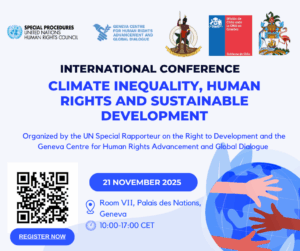
The Geneva Centre for Human Rights Advancement and Global Dialogue, along with the UN Special Rapporteur on the Right to Development, is pleased to share this important event.
The conference is co-sponsored by the Permanent Mission of Chile to the United Nations in Geneva, the Permanent Mission of the Republic of Vanuatu to the United Nations in Geneva, and the Permanent Mission of the Commonwealth of The Bahamas to the United Nations Office in Geneva.
Date and Venue: 21 November 2025, Room VII, Palais des Nations, Geneva
Format: This hybrid conference will be held both in-person and online, offering an inclusive platform to discuss human rights and climate change.
Conference Structure: The event will open with high-level statements from co-sponsoring Permanent Missions and keynote speakers, including UN Special Rapporteurs. Following this, three one-hour panels will focus on:
- Addressing adverse impacts on selected socio-economic rights: Discussing ways to address adverse impacts of climate change on rights to food, housing, education and health.
- Responding to differentiated and disproportionate impacts: Examining how to respond to differentiated and disproportionate impacts of climate change on children, women, older persons and Indigenous Peoples.
- Right to development as a pathway to overcome climate inequality: Exploring how various aspects of the right to development such as intergenerational equity, intersectionality, fair distribution, active, free and meaningful participation, and international cooperation provide a transformative pathway to overcome climate inequality.
Each panel will feature brief presentations from experts, followed by an interactive dialogue, concluding with final remarks from the moderator.
Context and Objectives:
The Inter-American Court of Human Rights in its advisory opinion on “Climate emergency and human rights” noted “the role of inequality between individuals and nations in relation to the human causes of climate change and its disproportionate impact on those who have contributed least to those causes and yet are in a situation of greater vulnerability to its impacts” (para 261).
In a similar vein, the International Court of Justice in its advisory opinion on “Obligations of States in respect of climate change” recognised, among others, sustainable development, common but differentiated responsibilities and respective capabilities (CBDR) and equity as guiding principles to interpret the obligations of States. The Court noted that the principle of CBDR “reflects the need to distribute equitably the burdens of the obligations in respect of climate change, taking into account, inter alia, States’ historical and current contributions to cumulative GHG emissions, and their different current capabilities and national circumstances, including their economic and social development” (para 148).
Both courts also acknowledged that climate change has disproportionate impacts on groups such as children, women, Indigenous Peoples and persons with disabilities. The judicial recognition of various facets of climate inequality is in line with what scholars, climate activists and various UN entities and human rights mechanisms have been arguing for years.
Against this background, this conference seeks to provide a platform to foster dialogue among various stakeholders around the intersection of climate inequality, human rights and sustainable development. It will bring together experts to co-create human rights-based solutions to various facets of climate inequality, share good practices and foster transformative collaboration among decision-makers for a just, fair and sustainable future.